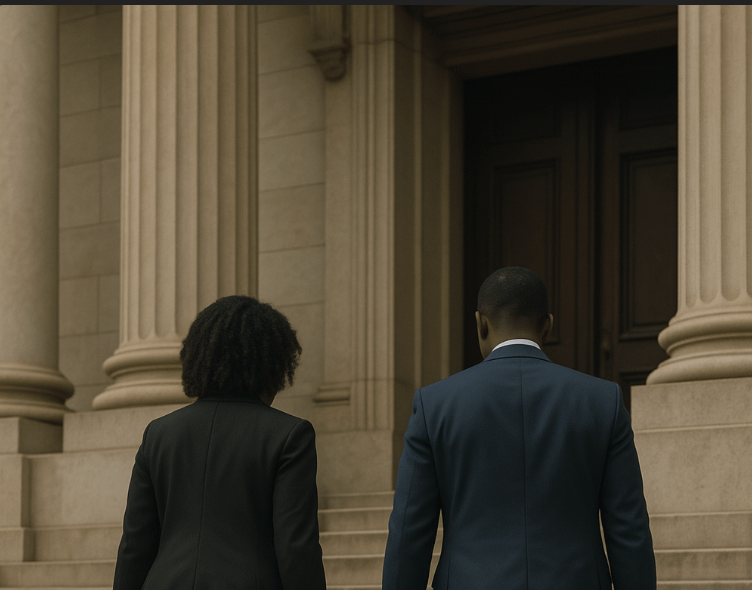Table of Contents
Most personal injury cases never reach trial. Instead, they are resolved long before a jury hears any testimony. Still, the possibility of trial is always present, and understanding when a case may proceed to court and what the process looks like can help you feel more confident about your next steps.
Here’s what you need to know about why most claims settle, why some disputes end up in front of a jury, and what the steps in a personal injury trial typically involve.
Quick Answer: Why Some Personal Injury Cases Go to Trial
Most personal injury cases settle out of court, but disputes can arise when insurance companies deny responsibility, downplay injuries, or refuse to offer fair compensation. In these situations, going to trial may be the only way to secure justice. Trials can feel overwhelming because they involve complex procedures, strict deadlines, and the uncertainty of leaving your future in the hands of a jury. Having an experienced personal injury lawyer on your side means you don’t have to face these challenges alone.
Most Cases Don’t Start With a Lawsuit
Contrary to popular belief, most personal injury disputes do not begin with a lawsuit. Instead, they usually start with an insurance claim. After an accident, the injured party (or their attorney) notifies the responsible party’s insurance carrier and submits a demand letter outlining the facts of the accident and the damages sought. The insurer then reviews the evidence and may offer a settlement. Many claims end through negotiation without the need for a personal injury lawsuit.
A lawsuit is typically filed only when these negotiations break down. If the insurer denies liability, disputes the severity of the injuries, or refuses to make a fair offer, the injured party may have no choice but to escalate the matter.
Filing a suit does not automatically mean a trial will happen, but it does preserve the injured party’s (also known as the plaintiff) rights and keeps the case moving forward.
Why a Personal Injury Case Might Go To Trial
If settlement talks stall, the courtroom becomes the arena where disputes are resolved. A case may proceed to trial for several reasons:
- Disagreement over liability: The defendant or their insurer may argue that the plaintiff was at fault or that another party caused the accident.
- Dispute about injuries: Insurers sometimes claim the injuries were pre-existing, exaggerated, or unrelated to the accident.
- Conflict over damages: Even when liability is clear, there may be sharp disagreement about the value of lost wages, medical bills, or pain and suffering.
- Bad faith negotiation: Some insurers refuse to make reasonable offers, forcing plaintiffs to seek justice in court.
Ultimately, a trial is considered a last resort. Most clients prefer resolution without taking the witness stand, but sometimes presenting the facts before a jury is the only way to obtain full and fair compensation.

Why Most Personal Injury Cases Settle
Settlements have many advantages, which explain why it is the preferred path in most personal injury claims:
- Lower cost: Trials are expensive. Expert witnesses, court fees, depositions, and extended preparation drive up costs for both sides. Settlement significantly reduces these expenses.
- Less time: A trial can take months or even years, while a settlement often happens much sooner. Injured plaintiffs usually need compensation quickly to cover medical bills and lost income, making a settlement an attractive option.
- Reduced stress: Courtroom testimony can be emotionally taxing. For accident victims, reliving the event in front of a judge and jury can feel overwhelming. Settlement avoids this emotional toll.
- Certainty: Juries are unpredictable. Even with strong evidence, there is always a chance that a jury may side with the defense or award a far lesser amount than expected. Settlement gives both sides control over the outcome and eliminates the risk of walking away empty-handed.
- Privacy: Trials are public proceedings, meaning personal medical details and financial information may become part of the public court record. Settlement allows these sensitive matters to remain confidential.
Finally, settlement can preserve relationships and avoid hostility. In some cases (such as disputes involving neighbors, coworkers, or even family members) resolving matters outside of court helps both parties move forward without the lingering bitterness that a contentious trial can create.
While settlement may mean compromise, it also provides speed, security, and control—three things that are especially valuable when you are trying to recover from serious injuries and move on with your life.
What is the Process of Taking a Personal Injury Case To Trial?
Although most cases settle, it is beneficial to understand the steps involved in a personal injury trial. The process is designed to ensure fairness, transparency, and an opportunity for both sides to present their case.
Filing the Lawsuit
If negotiations fail, the injured party files a formal complaint in civil court. The defendant (the alleged at-fault party) is then served with the lawsuit and must respond, usually by admitting, denying, or raising defenses to the allegations. This stage sets the legal foundation for the entire case.
Discovery in Personal Injury Cases
Discovery is the information-gathering phase where each side exchanges evidence. This may include depositions, interrogatories (written questions), medical records, accident reports, and expert evaluations. Discovery in personal injury cases is often the most time-intensive step, but it is critical because it allows both parties to assess the strengths and weaknesses of the case. Many disputes actually settle during or right after discovery, once the evidence is entirely laid out and both sides understand the risks of trial.
Pre-Trial Motions and Hearings
Before trial, attorneys may file motions to dismiss certain claims, exclude prejudicial evidence, or compel disclosure of documents. Judges also hold hearings to clarify legal issues, establish deadlines, and encourage settlement.
Trial
If a settlement has still not been reached, the case proceeds to trial. Both sides present opening statements, question witnesses, introduce evidence, and make closing arguments. A judge or jury then decides liability and damages.
A settlement can occur at any stage, even during the trial, if both sides reach an agreement. Such flexibility is one reason why very few cases ever reach a final verdict.
The Importance of Preparation
Even though the majority of claims never reach a courtroom, preparing for a personal injury trial is imperative for the case. Insurers know which personal injury attorneys are willing to fight in court and which are likely to fold. A personal injury lawyer who is ready to take a case all the way to trial often secures better settlements for their clients, simply because the other side knows they cannot be intimidated.
At Levin Litigation, our personal injury attorneys prioritize gathering strong evidence, consulting experts, and keeping clients informed about the process. Whether the matter resolves through settlement or trial, preparation ensures that your rights are fully protected.

Do Personal Injury Cases Go To Trial? FAQs
How often do personal injury cases actually go to trial?
Only a small percentage, often cited as less than 5% reach trial. Most cases are resolved through settlement negotiations or mediation.
Can I still settle after filing a lawsuit?
Yes. Filing a lawsuit does not lock you into a trial. Settlement can occur at any point before, or even during, the trial itself.
What is the difference between a settlement and a trial verdict?
A settlement is an agreement between the parties, while a trial verdict is a binding decision handed down by a judge or jury. Both resolve the case, but a settlement avoids the risks and unpredictability of a trial.
Do I need to testify in court?
If your case goes to trial, you may need to testify about the accident and your injuries. Your personal injury attorney will prepare you thoroughly so you feel confident answering questions from both sides.
Get in Touch With Our Florida Injury Attorneys To Learn More About How We Can Help
Most personal injury cases resolve without ever stepping into a courtroom. Still, trial remains an important safeguard when negotiations fail, and knowing what to expect can give you peace of mind.
If you have been injured and are navigating the personal injury lawsuit process, do not leave your case to chance. At Levin Litigation, our attorneys are skilled negotiators and fearless trial advocates. We prepare every case as if it were going before a jury, because sometimes that’s exactly what it takes to secure justice. To discuss your situation and legal options, contact us today.




